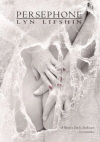Persephone
It says on the “About the Author” page at the back of Persephone that “Lyn Lifshin has written more than 120 books.” I want to read all of them. Here is not only a prolific but gifted and generous poet. In Persephone alone, Lifshin offers 189 poems, every one of them skillfully crafted and emotionally resonant. Some of them are overwhelming.
It says on the “About the Author” page at the back of Persephone that “Lyn Lifshin has written more than 120 books.” I want to read all of them. Here is not only a prolific but gifted and generous poet. In Persephone alone, Lifshin offers 189 poems, every one of them skillfully crafted and emotionally resonant. Some of them are overwhelming.
The book is broken up into ten sections or themes, ranging from the personal loss of one’s mother to the national tragedy that was 9/11. Loss is prevalent throughout Persephone, even the loss of a limb in several poems, such as the excellent “Though I Didn’t See It,” about the time “Paul / McCartney’s wife / took off her leg / on Larry King.” The speaker doesn’t “find it strange or / gruesome,” though some do. The end of the poem, which introduces us to a Nam vet the speaker knew who lost a leg overseas, brings the poem to a powerful and touching close.
Perhaps the most effective and moving poem of the bunch is in the section called “Bay of Love and Sorrow: Mother Poems.” It’s called “My Mother Hated the Song of the Whales,” and it brought tears to this rugged reviewer’s eyes:
I could not believe my mother,
who called me five times a day sometimes,
wouldn’t always be there, on the phone, ready to
come and take care of me when I had the flu.
. . .
“Look,” my mother said, “I’ve hardly had
to sit down, I think I’m getting stronger.”
But of course she isn’t, and for anyone who has recently lost a parent, this is rough (but rewarding) going.
Certain images recur throughout, none so prominent as roses or the color rose. In “On the Shortest Day of the Year,” a woman passes “black ruby roses” and the speaker imagines “those tissue thin roses.” In “Lips,” we find a symbolic “raft of roses,” “a sea of / roses.” Roses represent life, but life in its most delicate and transitory state. Black roses reappear in “Trying to Write the Blue Out of Me,” growing “in those / holes where you yanked / the roots out.”
They are omnipresent, like Lifshin’s prodigious body of work itself.




